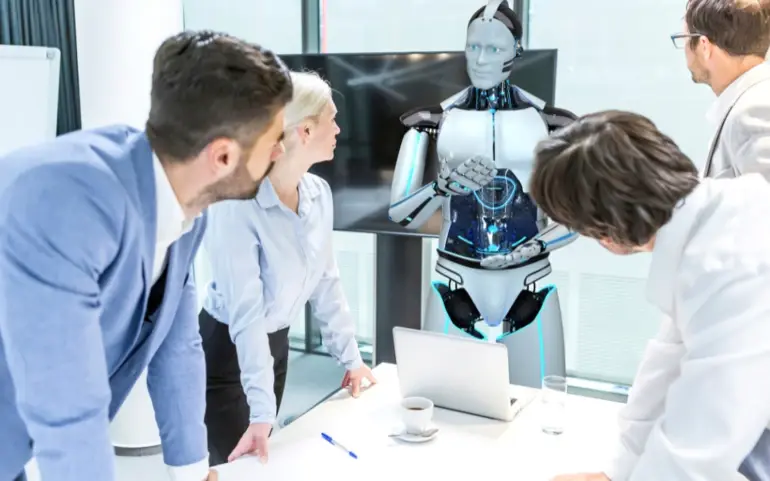
Article contributed by Tim Mercer, CEO of Vapour
Using robots for work instead of people has been disapproved in the past for leading to unemployment, being too expensive and causing mistrust. For these reasons, and others, many organisations choose not to use Robotic Process Automation (RPA) in business settings. Not only does this mean they miss out on unlocking the full potential of automation, but this stops their employees from working in a more efficient way – something which is increasingly important for hybrid working.
But why does it have to be one or the other? People or robots? The business world would surely be so much better served if companies used this technology to their advantage, to support and assist employees, rather than replace them.
These misconceptions must be addressed to make way for the rise of the ‘cobot’ – complementary and collaborative technology which takes the mundane, time-consuming tasks off employees’ hands. Hopefully then, businesses of all sizes will harness the opportunities RPA and ‘cobots’ bring.
1. Robots will take our jobs
This is a common argument which stems from traditional lines of work – like factory staff in manufacturing or cashiers in retail services. Although roles in these industries have decreased as machines have been introduced, jobs elsewhere have opened. Skilled individuals are still needed in these sectors to service and maintain robots for a start, and people are still required to serve customers in situations where computers cannot.
But this misconception also trickles down to office-based roles. Employees might think their jobs are in danger if a robot can perform the same tasks, but this isn’t the case. RPA technology has been developed to help employees by taking on the burden of time-consuming, manual processes which drain valuable time. Consequently, staff can apply their skills to other parts of their role which require more human intelligence and emotion – responsibilities which progress the business.
Rather than eliminating jobs, RPA is therefore a strategic enabler which helps teams work more efficiently and productively.
2. Robotic Process Automation is too expensive
Traditionally robotic technology would have only been accessible to those with big budgets. Installing and maintaining large machines would have been costly, which meant a lot of businesses weren’t utilising them.
But progression in research and development has allowed companies to create a cheaper and easier way to make robotics. Many of the physical robots seen on the production line or in retail for example are now built with sophisticated 3D printing. The materials are less expensive, and the robots are a lot smaller than before, reducing costs.
But advancement in RPA technology for office-based organisations and contact centres has also come a long way. This smart tech uses AI, machine learning and easy improvement of rules-based processes to help businesses improve efficiency and deliver excellent customer service levels. Although these robots are ‘invisible’ and require innovative tech to make them work, RPA solutions are accessible for businesses of all sizes and with varying budgets.
3. Robots are more intelligent than people
We created robots to be smart, to do the things humans might not necessarily be able to do or might not want to do. But at the same time, it’s a fact that people need human interaction.
Chat bots and machine agents may well be able to solve minor customer issues or queries. However, every now and then, clients require empathetic communication and expect staff to go the extra mile in certain situations. This is something that cannot be replaced by robots.
4. RPA is only used by factories
In the past robots were predominantly used to automate processes on the production line, and still are. But now, automation is everywhere, in many different types of industries. From finance to sales, and insurance to ecommerce, RPA is the latest business trend helping millions of workers.
RPA brings many benefits to a company. By boosting employee productivity and efficiency, teams can focus on the high value tasks which drive the business forward. Also, automating manual processes reduces the risk of human error and compliance issues, which is significantly important in regulated, document-heavy industries like law and insurance. RPA enables all businesses to overhaul end-to-end processes and work ever-smartly – something which employees of the future demand.
5. RPA is too complex
The theory is that, yes, RPA-led change can be transformational, but it’s also possible to start small with automotive, singular processes for marginal gains.
By helping businesses demystify these myths surrounding robots and RPA, it opens a new level of efficiency. Organisations can harness ‘cobots’ to work collaboratively alongside employees, taking on the less engaging and fulfilling tasks – keeping staff happy and able to focus on high service levels.
‘Cobots’ are the future of work.

